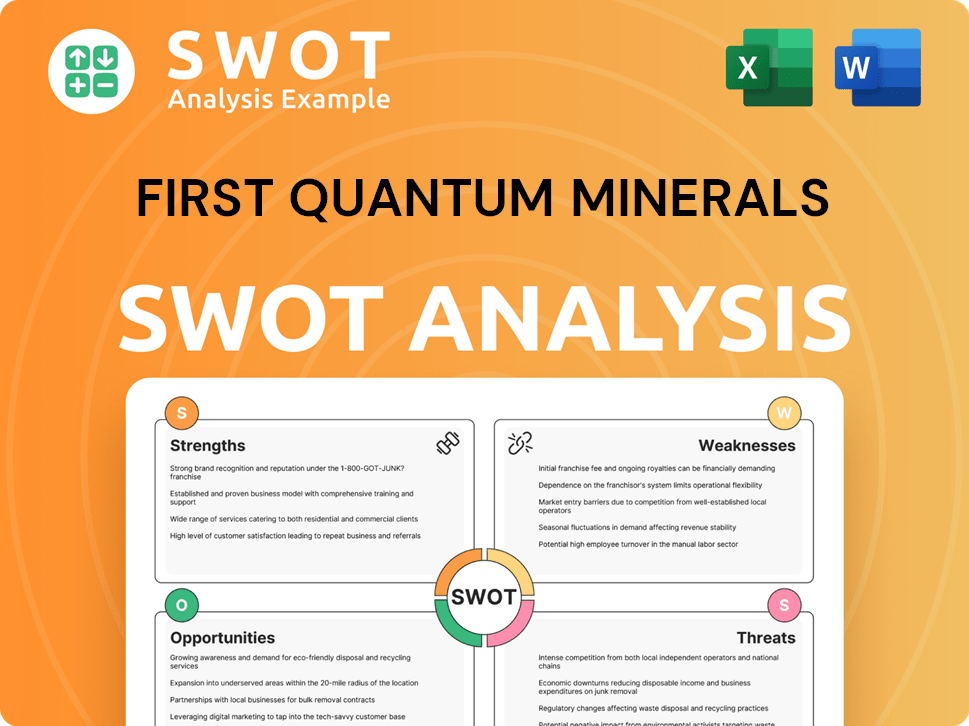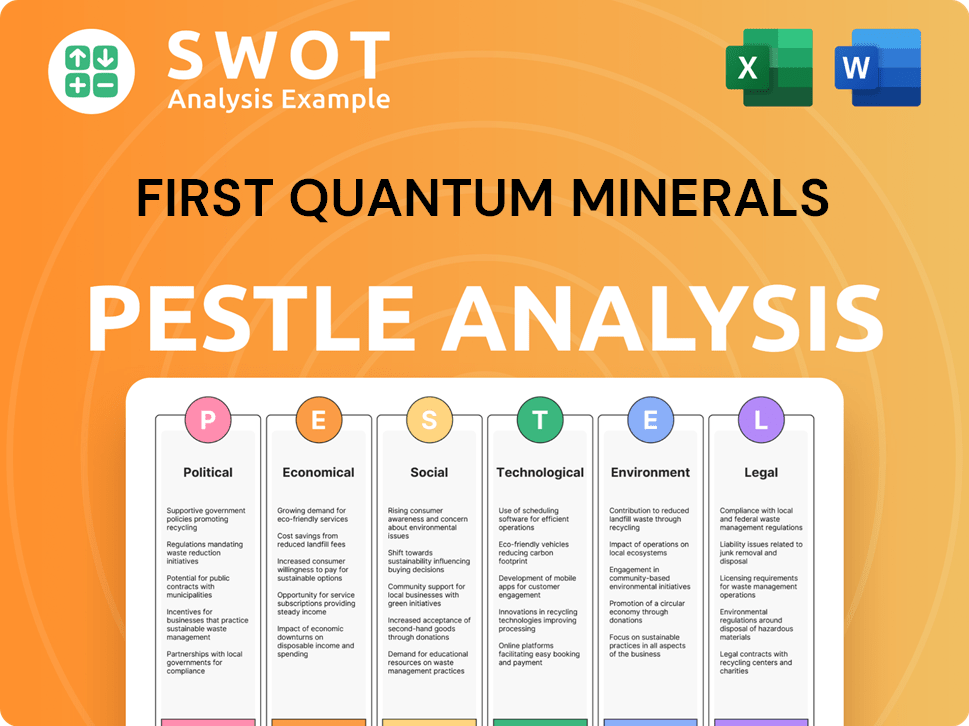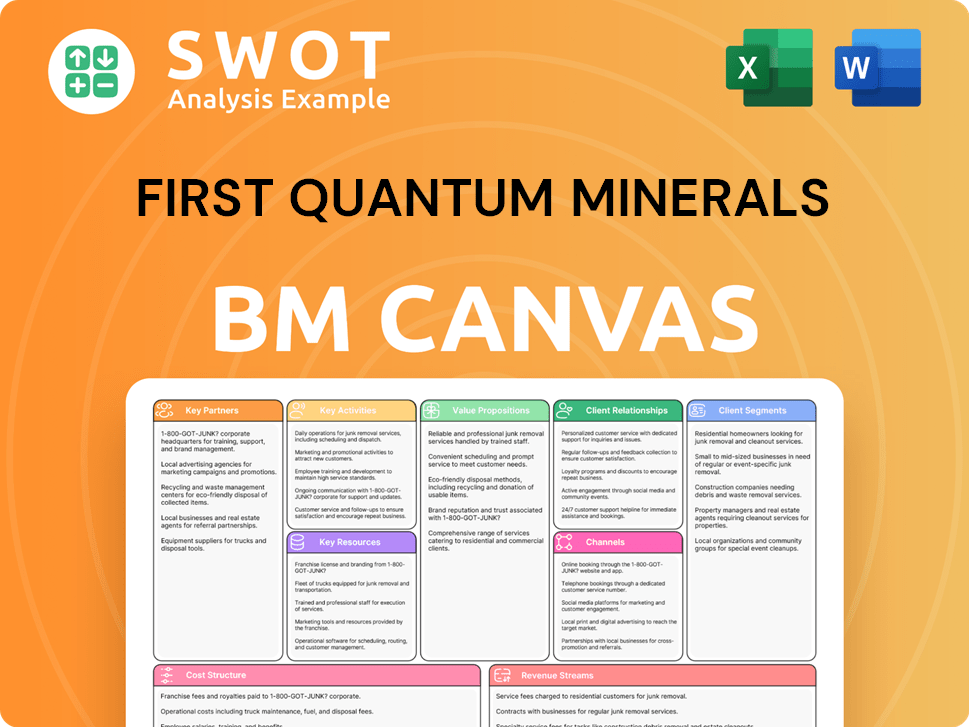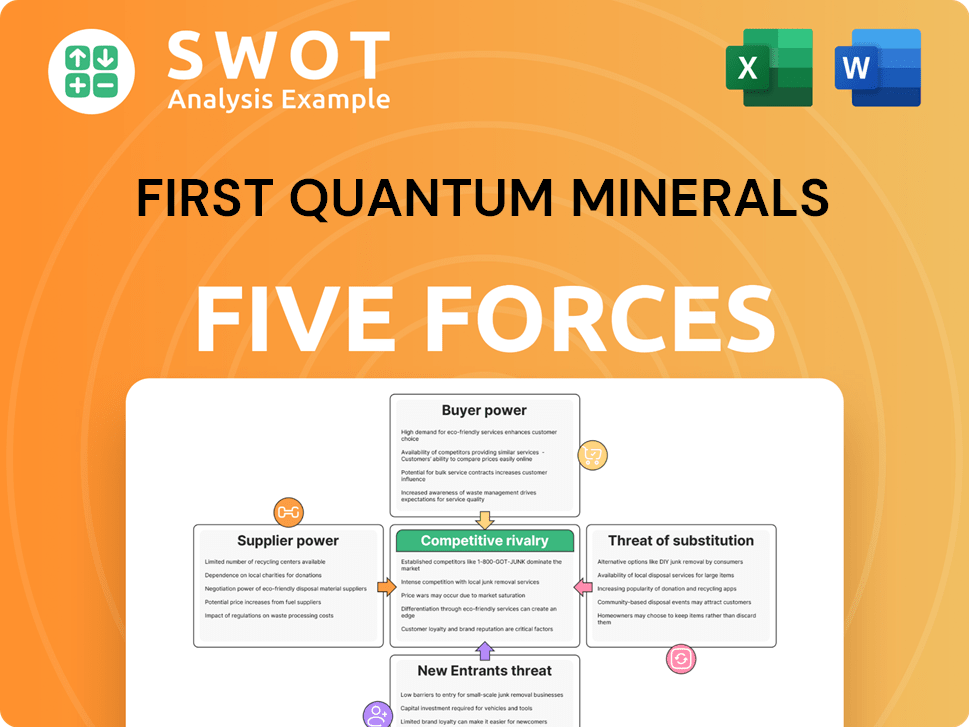First Quantum Minerals Bundle
Who Really Controls First Quantum Minerals?
Unraveling the ownership structure of a major First Quantum Minerals SWOT Analysis is like navigating the complex landscape of the global copper mining industry. Understanding "Who owns FQM" is essential for investors, analysts, and anyone interested in the future of this mining company. The recent events surrounding the Cobre Panamá mine vividly demonstrated how critical ownership is to a company's operations and strategic direction.

This exploration into FQM ownership will uncover the evolution of its shareholder base, from the initial founders to the current mix of institutional and individual investors. We'll examine the key players influencing the copper mining giant, and assess how ownership has shaped its response to market dynamics and government relations. Discover the answers to questions like "Who are the major investors in First Quantum Minerals?" and "Is First Quantum Minerals a public company?" to gain a comprehensive understanding of this influential player in the mining industry.
Who Founded First Quantum Minerals?
First Quantum Minerals, a significant player in the mining industry, was established in 1996. The company's foundation involved a team of key individuals with diverse expertise. Understanding the initial ownership structure provides insight into the company's early strategic direction.
The founders of First Quantum Minerals were Philip Pascall, Martin Rowley, and Clive Newall. Pascall, with his engineering background, took on the roles of Chairman and CEO. Rowley, a geologist, served as Director of Exploration, and Newall, bringing financial acumen, was the Director of Business Development. This team structure highlights the company's focus on mining operations, exploration, and financial management from its inception.
While the exact initial equity distribution isn't publicly available, it's common for founders to hold substantial stakes. This reflects their commitment and investment in the company's vision. Early backers likely included private investors and venture capital firms specializing in the natural resources sector, providing the necessary capital for exploration and project development. These early agreements often included provisions to manage founder commitment and potential ownership transitions.
The vision of the founding team, centered on developing large-scale, low-cost copper projects, shaped the company's initial control and operational footprint. The company's focus on copper mining has been a core element of its operations. To learn more about their business model, you can read about the Revenue Streams & Business Model of First Quantum Minerals.
The initial ownership of First Quantum Minerals involved founders with expertise in mining, geology, and finance, setting the stage for its strategic direction. Early investors, including private individuals and venture capital, played a crucial role in funding exploration and project development. The founders' vision for large-scale, low-cost copper projects directly influenced the company's initial operational strategy.
- Philip Pascall, Chairman and CEO, brought extensive experience in the mining industry.
- Martin Rowley, Director of Exploration, provided geological expertise.
- Clive Newall, Director of Business Development, contributed financial knowledge.
- Early funding came from private investors and venture capital firms specializing in the natural resources sector.
First Quantum Minerals SWOT Analysis
- Complete SWOT Breakdown
- Fully Customizable
- Editable in Excel & Word
- Professional Formatting
- Investor-Ready Format

How Has First Quantum Minerals’s Ownership Changed Over Time?
First Quantum Minerals (FQM) transitioned into a publicly traded entity, listing its shares on the Toronto Stock Exchange (TSX). This initial public offering (IPO) marked a pivotal moment, opening the door to wider public ownership and access to capital markets. The evolution of FQM ownership has been marked by significant shifts, particularly the increasing influence of institutional investors.
The ownership structure of this mining company has seen considerable change since its IPO. Institutional investors now hold a substantial portion of the shares. Major acquisitions and divestitures, such as the 2013 acquisition of Inmet Mining, have also played a role in shaping the ownership landscape. These strategic moves have generally aimed at consolidating assets and enhancing the company's global market position.
| Milestone | Impact on Ownership | Date |
|---|---|---|
| Initial Public Offering (IPO) | Transition to public ownership, allowing broader investment. | Specific date varies; ongoing. |
| Acquisition of Inmet Mining | Increased share issuance, affecting ownership distribution. | 2013 |
| Institutional Investor Activity | Increased influence from large investment firms. | Ongoing, particularly since IPO. |
As of early 2024, major institutional holders of FQM shares include BlackRock Inc., The Vanguard Group, and Capital Research Global Investors. These firms collectively hold significant percentages of outstanding shares. The influence of these large institutional investors often extends to company strategy and governance through their voting power. Individual insiders, including executives and board members, also maintain stakes, aligning their interests with the company's long-term performance.
FQM's ownership structure has evolved from its IPO, with institutional investors now holding a significant portion of shares.
- Institutional investors, such as BlackRock and Vanguard, are major shareholders.
- Strategic acquisitions have influenced the ownership landscape.
- Insiders also hold stakes, aligning with the company's performance.
- Understanding FQM ownership is crucial for investors in the mining industry.
First Quantum Minerals PESTLE Analysis
- Covers All 6 PESTLE Categories
- No Research Needed – Save Hours of Work
- Built by Experts, Trusted by Consultants
- Instant Download, Ready to Use
- 100% Editable, Fully Customizable

Who Sits on First Quantum Minerals’s Board?
The board of directors at First Quantum Minerals (FQM) is crucial for its governance and how it relates to its ownership. As of early 2024, the board includes both executive directors, who are part of the company's management, and independent directors, who provide external oversight. Key board members represent long-term interests in the company, alongside independent members who adhere to governance best practices. Institutional investors often engage with the board on governance matters, although specific board members representing major shareholders are not always explicitly stated.
The composition of the board reflects the company's commitment to both operational expertise and independent oversight. This structure helps ensure that decisions are made with a balance of internal knowledge and external perspectives. The board's role is particularly important in navigating challenges and opportunities within the mining industry, including those related to environmental impact and government relations.
| Board Member | Role | Notes |
|---|---|---|
| Tristan Pascall | CEO | Oversees the company's strategic direction and operations. |
| Philip Pascall | Chairman | Provides leadership and guidance to the board. |
| Hannes Meyer | Director | Brings financial and operational expertise. |
First Quantum Minerals operates with a one-share-one-vote structure. This means each common share typically carries one vote. This standard voting arrangement ensures that voting power is directly proportional to the number of shares held. The company has faced scrutiny from activist investors, particularly concerning its operations and financial performance. The challenges at the Cobre Panamá mine in late 2023 and early 2024 led to increased investor scrutiny and discussions around risk management and operational stability. These events often lead to heightened engagement between the board, management, and shareholders, shaping decision-making within the company and influencing future strategic directions.
The board of directors at First Quantum Minerals plays a crucial role in overseeing the company's operations. The board includes a mix of executive and independent directors. This structure helps ensure that decisions are made with a balance of internal knowledge and external perspectives.
- The company operates with a one-share-one-vote structure.
- Investor scrutiny has increased, particularly regarding operations.
- The board's role is essential in navigating industry challenges.
- Learn more about the Target Market of First Quantum Minerals.
First Quantum Minerals Business Model Canvas
- Complete 9-Block Business Model Canvas
- Effortlessly Communicate Your Business Strategy
- Investor-Ready BMC Format
- 100% Editable and Customizable
- Clear and Structured Layout

What Recent Changes Have Shaped First Quantum Minerals’s Ownership Landscape?
Over the past few years, the FQM ownership structure has been influenced by several significant events. The situation surrounding the Cobre Panamá mine, which led to operational suspensions in late 2023 and early 2024, has been a major factor. This has affected the company's share price and increased investor scrutiny. First Quantum announced plans to streamline its asset portfolio in early 2024, potentially involving divestments and impacting its capital structure.
Industry trends within the mining industry also play a role. Increased institutional ownership and a focus on ESG (Environmental, Social, and Governance) factors are influencing investment flows and shareholder composition. Public statements and analyst discussions often cover future capital allocation strategies and operational optimizations, which can indirectly affect future ownership trends. For more insights, explore the Growth Strategy of First Quantum Minerals.
| Metric | Value | Year |
|---|---|---|
| Market Capitalization (approx.) | $14 billion | Early 2024 |
| Institutional Ownership (approx.) | Around 60% | 2024 |
| Copper Production (approx.) | Around 800,000 tonnes | 2023 |
Key considerations for FQM ownership include the impact of the Cobre Panamá mine, ESG performance, and the company's strategic responses to market dynamics. The company's ability to manage its financial implications and operational efficiencies will be critical in shaping its ownership profile in the coming years. Who owns FQM is a question constantly evolving with market changes.
Institutional investors hold a significant portion of shares. Key institutional holders include large asset management firms and investment funds. Their decisions heavily influence First Quantum Minerals stock performance and ownership trends.
ESG considerations are increasingly important. Investors are focusing on companies with strong environmental and social governance practices. This impacts investment decisions and can influence First Quantum Minerals shareholders.
The company's financial performance directly affects FQM ownership. Factors such as revenue, profitability, and debt levels influence investor confidence. Potential asset sales and strategic partnerships can also reshape its ownership structure.
Operational challenges, such as those experienced at the Cobre Panamá mine, can significantly impact the company. These events often lead to fluctuations in the First Quantum Minerals share price and affect ownership dynamics.
First Quantum Minerals Porter's Five Forces Analysis
- Covers All 5 Competitive Forces in Detail
- Structured for Consultants, Students, and Founders
- 100% Editable in Microsoft Word & Excel
- Instant Digital Download – Use Immediately
- Compatible with Mac & PC – Fully Unlocked

Related Blogs
- What are Mission Vision & Core Values of First Quantum Minerals Company?
- What is Competitive Landscape of First Quantum Minerals Company?
- What is Growth Strategy and Future Prospects of First Quantum Minerals Company?
- How Does First Quantum Minerals Company Work?
- What is Sales and Marketing Strategy of First Quantum Minerals Company?
- What is Brief History of First Quantum Minerals Company?
- What is Customer Demographics and Target Market of First Quantum Minerals Company?
Disclaimer
All information, articles, and product details provided on this website are for general informational and educational purposes only. We do not claim any ownership over, nor do we intend to infringe upon, any trademarks, copyrights, logos, brand names, or other intellectual property mentioned or depicted on this site. Such intellectual property remains the property of its respective owners, and any references here are made solely for identification or informational purposes, without implying any affiliation, endorsement, or partnership.
We make no representations or warranties, express or implied, regarding the accuracy, completeness, or suitability of any content or products presented. Nothing on this website should be construed as legal, tax, investment, financial, medical, or other professional advice. In addition, no part of this site—including articles or product references—constitutes a solicitation, recommendation, endorsement, advertisement, or offer to buy or sell any securities, franchises, or other financial instruments, particularly in jurisdictions where such activity would be unlawful.
All content is of a general nature and may not address the specific circumstances of any individual or entity. It is not a substitute for professional advice or services. Any actions you take based on the information provided here are strictly at your own risk. You accept full responsibility for any decisions or outcomes arising from your use of this website and agree to release us from any liability in connection with your use of, or reliance upon, the content or products found herein.